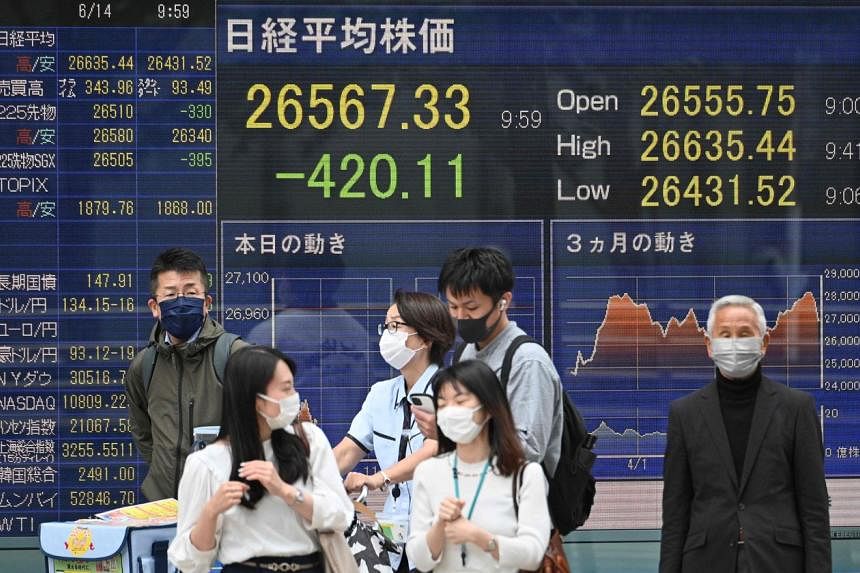TOKYO (REUTERS) - Asian stocks slipped and the US dollar stood by a two-decade high on the euro on Wednesday (July 6) as investors' fears deepened that Europe is leading the world into recession, while oil attempted to steady after a slide.
Brent crude futures bounced 1.4 per cent in morning trade to US$104.18 a barrel, nursing its wounds after a 9.5 per cent drop to a 2½-month low on Tuesday with worries that a global growth slowdown is going to sap demand.
Japan's Nikkei fell 1.3 per cent, on course for its first loss of the week. Hong Kong's Hang Seng index slumped 1.6 per cent, while the Shanghai Composite fell 1.4 per cent, dragged by worries about new Covid-19 cases in Shanghai risking fresh restrictions.
Singapore's Straits Times Index dipped 0.05 per cent as at 11.12am local time.
Overnight, Europe's Stoxx 600 index dropped 2 per cent and the euro plunged more than 1.5 per cent to US$1.0236, its lowest since late 2002 as talk of gas rationing spooked traders.
"The drumbeat is getting louder and louder about recession risk," said Mr Jason Teh, chief investment officer at Vertium Asset Management in Sydney.
"Right now, defence is the name of the game. It is the best strategy right now because in a recession, a lot of things can fall out of bed."
Uncertainty over Europe's gas supply has set prices rocketing. Benchmark Dutch gas prices have doubled since the middle of June and rose 7 per cent overnight to a four-month high.
Investors are also nervous about continuity of supply after the Nord Stream pipeline, which carries Russian gas to Germany, shuts for ten days for maintenance from July 11.
In Tokyo, shares of commodity trading firms Mitsui & Co and Mitsubishi Corp dropped more than 5 per cent after former Russian president Dmitry Medvedev threatened oil and gas supply cuts to Japan.
The British pound was pinned to a two-year low and not helped by the latest political crisis to hit Prime Minister Boris Johnson's government, with the resignation of his finance and health secretaries casting doubts on his longevity as leader.
After touching US$1.1899 overnight, the currency steadied at US$1.1964 in Asia.
A change in leadership, or speculation about it, could lend support but it is weighed heavily by an economic outlook that a new leader is unlikely to shift.
"Britain is in danger of being the slowest-growing major advanced economy next year, with the highest inflation rate and the biggest current account deficit," said Societe Generale strategist Kit Juckes. "That is quite a collection, and it represents a clear threat to the pound."
Elsewhere, the US dollar also stood tall, holding the risk-sensitive Antipodean currencies near two-year lows and dunking spot gold prices to their lowest this year. The Australian dollar was last huddled at US$0.6810, having slid 1 per cent overnight to a two-year trough of US$0.6762.
Spot gold was last steady at US$1,771 an ounce after its overnight fall. Safe-haven gold is down about 3 per cent this year, less than the steep losses for equities and bonds.
Investors now await the release of United States jobs data on Friday for further signs of whether the economy may fall into a recession.
"A strong payrolls figure may temper recession fears briefly, though it will also likely drive up two-year yields and probably will not be regarded as unambiguously positive by the equity investment community," ING analysts wrote in a note on Wednesday morning.
Bitcoin fell back below the key US$20,000 waterline, falling 2.77 per cent to trade at US$19,855.14.

